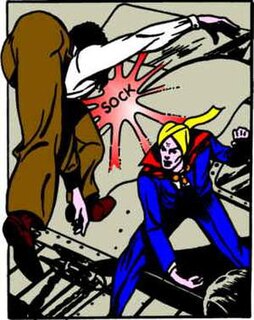 W
WL'Audace was a weekly children and comic magazine published in Italy from 1934 to 1944.
 W
WThe Cisco Kid is a fictional character found in numerous film, radio, television and comic book series based on the fictional Western character created by O. Henry in his 1907 short story "The Caballero's Way", published in the collection Heart of the West, as well as in Everybody's Magazine, v17, July 1907. Originally a murderous criminal in O. Henry's story, the Kid was depicted as a heroic Mexican caballero later in films, radio and television adaptations.
 W
WConnie is an American adventure comic strip created by the cartoonist Frank Godwin, who introduced a book illustration style to the comics page. The strip ran from 1927 to 1941 for the Ledger Syndicate. Connie debuted as a Sunday page on November 13, 1927. The strip was syndicated in France as Cora in the weekly paper Le Journal de Mickey.
 W
WKismet, Man of Fate is a fictional character, a superhero published by Elliot Publishing Company in the Golden Age of Comic Books. The series features adventures of an Algerian superhero who was thought lost by the Allies at the end of World War II. The character originally appeared in Bomber Comics #1 (1944), making him the first identified Muslim superhero.
 W
WKrazy Kat is an American newspaper comic strip by cartoonist George Herriman, which ran from 1913 to 1944. It first appeared in the New York Evening Journal, whose owner, William Randolph Hearst, was a major booster for the strip throughout its run. The characters had been introduced previously in a side strip with Herriman's earlier creation, The Dingbat Family. The phrase "Krazy Kat" originated there, said by the mouse by way of describing the cat. Set in a dreamlike portrayal of Herriman's vacation home of Coconino County, Arizona, Krazy Kat's mixture of offbeat surrealism, innocent playfulness and poetic, idiosyncratic language has made it a favorite of comics aficionados and art critics for more than 80 years.
 W
WLittle Lulu is a comic strip created in 1935 by Marjorie Henderson Buell. The character, Lulu Moppet, debuted in The Saturday Evening Post on February 23, 1935, in a single panel, appearing as a flower girl at a wedding and mischievously strewing the aisle with banana peels. Little Lulu replaced Carl Anderson's Henry, which had been picked up for distribution by King Features Syndicate. The Little Lulu panel continued to run weekly in The Saturday Evening Post until December 30, 1944.
 W
WMr. Mystic is a comics series featuring a magician crime-fighter, created by Will Eisner and initially drawn by Bob Powell. The strip featured in four-page backup feature a Sunday-newspaper comic-book insert, known colloquially as "The Spirit Section". It first appeared in 1940, distributed by the Register and Tribune Syndicate.
 W
WShield–Wizard Comics was the name of an American comic book series published by MLJ Magazines Inc., more commonly known as MLJ Comics, for thirteen issues between Summer 1940 and Winter 1944.
 W
WUncle Sam is a fictional superhero appearing in American comic books published by DC Comics. Based on the national personification of the United States, Uncle Sam, the character first appeared in National Comics #1 and was created by Will Eisner.
 W
WZip Comics was the name of an American anthology comic book series published by MLJ Magazines Inc., more commonly known as MLJ Comics, for 47 issues between June 1940 and Summer 1944. It featured a number of adventure, humor and costumed hero stories throughout the series, including the first appearance of superhero "Steel Sterling" and the earliest appearances of the humor strip Wilbur, who later had his own long-running series for Archie Comics.